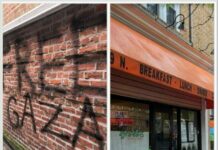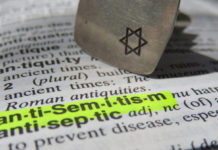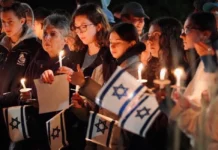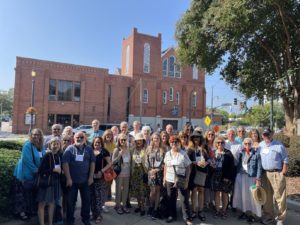
Thirty-one Philadelphia Jewish leaders returned to the City of Brotherly Love on Sept. 20 from the third annual Civil Rights Mission.
The trip, organized by the Jewish Federation of Greater Philadelphia’s Jewish Community Relations Council in partnership with the Anti-Defamation League Philadelphia and American Jewish Committee Philadelphia/Southern New Jersey, included visits to Atlanta and Montgomery, Selma and Birmingham, Alabama to tour civil rights-era landmarks, museums and memorials.
The third of its kind, the mission aimed to “change words into action” and “continue the dialogue between the Black and Jewish communities,” according to a Jewish Federation blog post about the trip.
“The current climate in our country and the division in our country made this mission even more relevant,” said Dave Gold, Jewish Federation Civil Rights Mission chair. “It opened my eyes to how we can never forget our history because if we do, it’s bound to repeat itself.”
Over three days, the group visited Ebenezer Baptist Church in Atlanta — where Rev. Martin Luther King Jr. served as co-pastor — and heard Rev. Sen. Raphael Warnock preach on a Sunday morning; they visited Montgomery’s National Memorial for Peace & Justice, the nation’s first memorial for lynching victims; and met with Joanne Bland, a participant in the 1965 “Bloody Sunday” march across the Edmund Pettus Bridge for voting rights for Black Americans; among other activities.
AJC Philadelphia/SNJ Regional Director Marcia Bronstein was most struck by the conversation the group had with Bland. Bland shared the hopes she had to revitalize the impoverished city of Selma as well as her involvement in Bloody Sunday.
Only 13 in 1965, Bland was a child when civil rights discourse heightened in the 1960s. Not allowed to sit at restaurant lunch counters, she remembered crossing the Pettus Bridge in the name of being able to eat ice cream at the lunch counter like her white counterparts.
“She said she and her sister walked across the bridge on Bloody Sunday where they were met with hoses and dogs and police beating them,” Bronstein said. “She asked us to help preserve history, help tell the story to, I guess, amplify social justice and activism.”
Robin Schatz, Jewish Federation’s director of government affairs, believed the trip put into perspective the role of Jews in the civil rights movement 50 years ago. She recollected the photo of King with Rabbi Abraham Joshua Heschel in 1965, marching together from Selma to Montgomery.
Despite previous solidarity between Jewish and Black people in the past, Schatz said, “Our role has been overstated.”
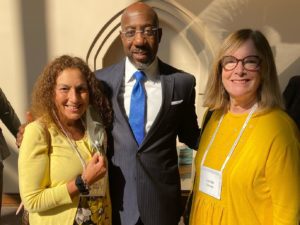
“This was an attempt to study these issues, to hear from the perspective of people who have suffered because of racist policies, whether overt or more hidden, and to see how we can come together to create a better society for everyone,” Schatz said.
White Jews in particular must reckon with their role in both being the victims and perpetuators of discrimination and white supremacy, argued ADL Philadelphia Director of Education Randi Boyette.
She most grappled with those two identities at the National Memorial for Peace & Justice. The group learned that in 1911, a white mob lynched Zachariah Walker, a Black man from Coatesville — about 39 miles from Philadelphia — as well as about the lynching of Leo Frank, a white Jew, in Atlanta in 1913.
“The experience of Black people in the United States is not the same experience as the Holocaust experience,” Boyette said. “But it packs an emotional punch to think of the immense suffering in both of those experiences that really resonated with me, I think as a human, but also as a Jewish person.”
Though the Civil Rights Mission took on different iterations, one in 2020 before the pandemic and one for Jewish Federation Women’s Philanthropy in May, the JCRC hopes to continue the annual trip, making it more accessible to the greater Philadelphia community.
As Jewish leaders return with a renewed perspective, they are already working on ways to increase Black-Jewish relationships and address racism in the Jewish community.
AJC will host the first part of its anti-racism book club at Rodeph Shalom on Nov. 2 with a moderated discussion of “The Case for Reparations” by Ta-Nehisi Coates; the Jewish Federation is working with the National Urban League and ADL on increasing voter engagement, carrying out a Get Out the Vote campaign for the November election.



